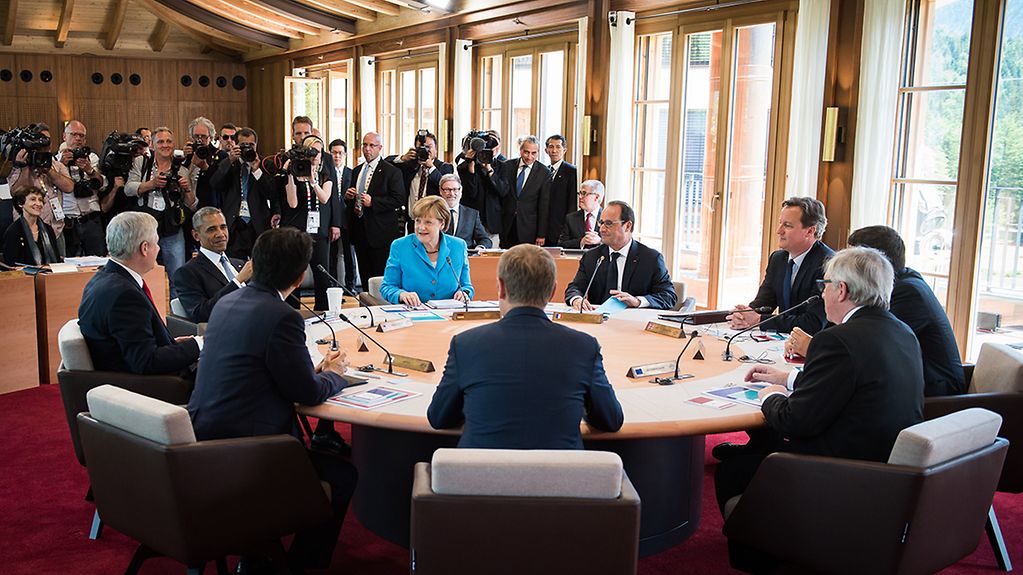Day one of the summit
During their first working session the G7 summit participants discussed economic issues and trade. Also on their agenda was the transatlantic free trade agreement TTIP. "We want to have achieved important milestones by the end of the year," said Chancellor Angela Merkel.
3 min reading time

The summit participants during their first working session in Schloss Elmau
Photo: Bundesregierung/Kugler
The heads of state and government from Canada, France, Germany, Italy, Japan, the United Kingdom and the United States of America have come together with the European Council President and the European Commission President at Schloss Elmau for the G7 summit.
Growth and values
The first working session focused on traditional economic matters. Under the banner "Growth and values" the participants discussed how leading economic nations can ensure sustainable growth in an ever more global world. They looked in particular at the better regulation and supervision of financial markets, and at ways of combating tax evasion and tax avoidance. Aspects such as health, women's participation in economic life and climate protection also played a role.
Trade policy and supply chains
During a second working session summit participants discussed trade policy and supply chains. As well as the transatlantic free trade agreements TTIP and CETA they also talked about mandatory international standards in supply chains.
In an interview with German TV after the working session was over Angela Merkel said that everyone was working hard on TTIP. She reminded viewers how much progress had already been made on the free trade agreement between Japan and the United States. "When it comes to creating more jobs, Europe should not be last in line, but should do everything it can to move things forward. We can do it, and we want to have achieved important milestones by the end of the year."
Merkel: Russia against our common values
At their working dinner the summit participants discussed foreign and security policy. Topics included stopping Iran's nuclear programme and bringing the civil war in Syria to an end. Chancellor Merkel said these were both issues on which Russia needed to be a partner.
Nevertheless, the German Chancellor does not feel that Russia can currently return to the Group of Eight. The G7 countries were unanimous on that she said in her interview with the German broadcaster ARD. By annexing Crimea Russia had gone against common values. "That is a barrier at the moment, and I do not see it being overcome so very quickly," the Chancellor said.
Open to different opinions
In an interview with the German broadcaster ZDF Angela Merkel acknowledged the beauty of the conference venue Elmau: "Germany should be allowed to show its best side, and I am pleased we are meeting in these surroundings."
The choice of location also showed that Germany was an open country, Merkel said. "At the same time Germany is showing that it is a country that accepts demonstrations, it also accepts opposing events, as long as no violence is involved. And I am proud of that."
Guests arrive in Upper Bavaria
On Saturday evening and Sunday morning the G7 participants flew into Munich Airport, where they were met by Bavarian Minister-President Horst Seehofer. A helicopter took them on to Schloss Elmau where Angela Merkel was waiting at the red carpet to welcome her guests.
Before their meeting, the heads of state and government and the two EU representatives met in front of the summit venue for the traditional group photo.